How to get into Destiny 2
Our beginner's guide to Bungie's sprawling space shooter.
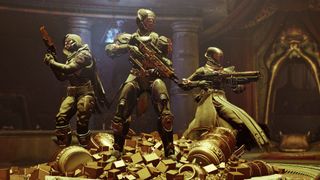
Destiny 2 is now free-to-play, and it's on Steam, which means lots of new players will be making first contact with Bungie's loot-driven shared-world shooter inspired by the best MMOs. Destiny 2 has grown enormously since September 2017, and it can all seem a bit confusing at the beginning, so we've produced this guide. It’s a cheat sheet, of sorts, to help you come to grips with what to expect from Destiny 2 New Light and Shadowkeep.
- Destiny 2 Season of the Worthy: everything you need to know

What do I get with New Light?
If you pick up New Light, and only New Light, you get access to Destiny 2's base game and all the Year One content. That means you get Destiny 2 and the Curse of Osiris/Warmind expansions. What you don't get is the story content within Forsaken, any of the Year Two season pass's story, or Shadowkeep.
On top of that, Bungie has promised that new Guardians will also receive some remastered sections from Destiny 1, including the Cosmodrome. This will allow new players to understand why Guardians are important and create a base understanding for the lore that's spread throughout Destiny 2. Essentially, it's a better jumping off point for those completely new to the series.
Even though you don't have access to the story elements from Year Two, you will still be able to explore the worlds from those expansions as well as the additional content, like strikes, event spaces, and raids.
This is a massive step for Bungie as it literally costs you nothing to get access to hundreds of hours of Destiny, and you can play with your friends for free. Even if you're on the fence, it's worth giving a shot. If you like it enough, you can always invest in the Year Two season pass and Shadowkeep, which would net you everything Bungie has to offer from September 2017 until September 2019.
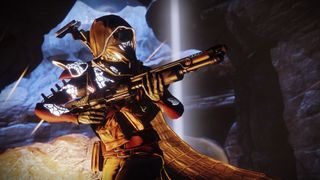
So, I know what expansions are free but what's actually in them?
There's a fair bit of content spread across all of the expansions and zones you get for free with New Light. This is what's included in each section of the game.
Destiny 2—This is the base game, you'll get access to the Leviathan raid, all the standard strikes, the EDZ (Earth), Nessus, Titan, and IO as explorable locations, and the standard PvP Crucible content.
The biggest gaming news, reviews and hardware deals
Keep up to date with the most important stories and the best deals, as picked by the PC Gamer team.
Curse of Osiris—A small expansion that adds Mercury as a (limited) explorable area. The expansion adds a short sprint of story missions focusing on the rogue warlock Osiris, and includes the newly designed Raid Lair, Eater of Worlds. Curse of Osiris also lets you grind toward some themed weapons, though none of them are particularly great in PvE or PvP at the moment. One for collectors.
Warmind—Warmind covers the resurrection of Rasputin, an AI from Destiny 1. It adds Mars as a new locale, the Escalation Protocol horde mode event, and some tweaks to the PvP format. There wasn't a great deal to this expansion outside of a lot of resource collecting, but Escalation Protocol was fun, challenging, and added one of the most ridiculous shotguns to Destiny 2.
Forsaken—This was a biggie, it added two new areas, Dreaming City and Tangled Shore, on top of a new PvPvE (Player versus Player versus Environment) game mode called Gambit, the Blind Well, and a new raid called The Last Wish. Furthermore, it was Destiny 2's first level cap increase, from 30 to 50, added new weapons like bows, and a third skill tree for each type of Guardian. For many this is the expansion that fixed Destiny 2, and it's essential if you enjoy the free New Light story missions.
Season of the Forge—As the first official season in Destiny 2, Year Two, Season of the Forge was a mixed bag, mostly because it required players to grind up a lot to access the new events. Season of the Forge adds the Black Armory content, which added 1-3 player Lost Forge challenges to pre-existing areas. It also added the Scourge of the Past raid. The forges let you work toward crafting weapon archetypes, and you could do so repeatedly to land just the right randomized weapon roll. Plus there were a good few new exotic weapons added as quests/hidden rewards too.
Season of the Drifter—If you don't like Gambit this might be the biggest letdown. It added a new variant of Gambit, Gambit Prime, the Allegiance quest line, and the Reckoning events. It was bundled alongside some quality of life updates, a few exotic quests, and new maps for existing modes, but largely there was not a lot to play through.
Season of Opulence—Opulence came out swinging with a new raid called the Crown of Sorrows, a new 6 man PvE mode called the Menagerie, and some more exotic quests. The expansion also gives you runes that you can slot into a goblet to guarantee certain drops in the Menagerie. It's a decent activity and a great way to round out your gun collection.
And throughout all of those expansions, the underlying story and mythos of Destiny 2 was expanded upon time and time again with every update.
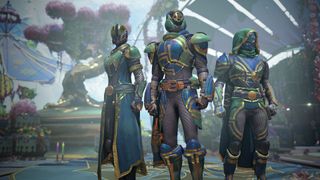
What class should I play?
You have three character slots in Destiny 2 and three classes. If you really love Destiny, you can max out one of each class, or level three Titans if you absolutely want to.
Hunters—Hunters are stealthy creatures, focused on setting traps and slinging sick fiery revolvers. Their key supers include a bow and arrow that can tether enemies in one spot (which is fantastic in PvP), a multi-shot revolver that can kill a fellow Guardian with one pull of the trigger, and a staff wielding, Jedi-like, super that shocks anything it touches to death. Their primary role is to clear smaller enemies in swathes or deal some of the highest damage in the game with the Gunslinger super and the Celestial Nighthawk exotic helmet.
Warlocks—These guys are literal space wizards. Casting massive destructive orbs, shooting lightning from their chest/fingertips, and flying with a flaming sword are some of the more iconic supers, but the most common is now their unbelievably strong Well of Radiance that acts as a support tool for any and every team. More often than not, Warlocks act as a support role, ensuring nobody in the team falls during difficult activities, but thanks to the diversity of their kit they can pretty much do anything.
Titans—Broad shoulders and narrow room for error, Titans are currently one of the more underrepresented classes in Destiny 2. But, that doesn't mean they don't serve a purpose. Titans can rain down flaming hammers, fire through the air like an electrified missile, and utilize a shield to bash through enemy defenses or deflect incoming bullets. Titans are unbelievably dominant in PvP thanks to their one hit K.O. shoulder barge and are often relied upon to apply a debuff on larger enemies during team events. More often than not, Titans can be pretty flexible but don't excel as a support class or as your primary source of damage.
Realistically, you can play any class you like and their kits are all unique in their own way—though every subclass covers one of the three energy types (Void, Solar, and Arc). Thanks to Destiny 2's structure, you'll often find that creating multiple characters and switching between them doesn't impact your ability to fight back the Darkness with all of your favorite weapons.
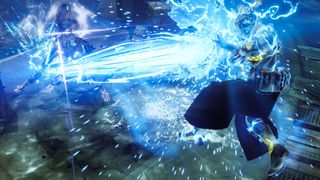
What's the best way to level up?
You might have heard this advice when it comes to Destiny and heaps of MMOs: Level to max, and then the "real game" begins. With the advent of Shadowkeep and Year Three, that old adage is now defunct.
Now all characters start with no levels and have a base Power Level of 750, making you strong enough to experience any of the Year One and Year Two content without the need to participate in a tedious grind. That being said, XP still remains, and is now funnelled into your Seasonal Artifact and your Season Pass.
How do I improve my Season Pass/Seasonal Artifact?
The simplest answer here is getting XP. Now that Fireteam Medallions are a thing of the past, there’s little in the way to boost your XP outside of a few ghost shells.
Thankfully everything in the entire galaxy helps in the XP grind. Popping heads, bounties, event participation. The key point is to keep on playing. If you complete all of your bounties on one character, just hop to the next. Because the Season Pass and Seasonal Artifact are tied to your account, any experience gained on any character contributes to your overall levels.

The Power Level grind
After reaching the level cap, the next step is to grind out your Power Level. Power Levels dictate which activities you are able to enter and will also be measured as a means of survivability.
Ideally you want to hit the max Power Level, which is believed to be 960 without Seasonal Artifact additional power, as soon as possible. Then find the perfect gear to mod, infuse, and apply your preferred shader to.
The starting point in all of this is to complete activities that reward Powerful Gear. Powerful Gear always guarantees a drop that’s higher than or equal to your current Power Level up until 950. After that, you'll need Pinnacle Gear.
Each reward falls within a tier, depending on the activity. So far we've only seen Tier 1, Tier 2, and Pinnacle Gear drops, but with Vex Offensive and the new raid to be released there could be higher tiers to come.
Activities and their rewards
Tier 1
- Complete 8 Crucible Bounties
- Complete 8 Vanguard Bounties
- Complete 8 Gambit Bounties
- Complete 8 Gunsmith Bounties
- Complete 3 Nightmare Hunts
- Complete 5 Nightfall: The Ordeal runs
- Complete 3 Strikes matching the elemental burn
- Complete 8 Eris Morn Bounties
- Complete a weekly story mission through Eris
- Complete a memory on the moon
- Complete Bounties to satisfy Ikora Rey
- Complete 3 Crucible Core Matches
- Complete 3 Crucible Rotator Matches
- Complete Events in the Flashpoint location
Tier 2
- Complete 3 Gambit Matches within the week
- Complete your weekly Clan contribution
- Participate in Vex Offensive
Tier 3:
- Collect Vex Parts for Ikora Rey
- Complete the Garden of Salvation raid
Pinnacle
- Score over 100,000 in Nightfall: The Ordeal
It’s presumed that the Raid and Vex Offensive will bolster the Pinnacle and Tier 2 brackets, respectively. On top of that, players can earn additional Powerful Rewards by completing Exotic Quests, and through random Prime Engrams found throughout the solar system and by playing.
Make sure to get a free Powerful Engram by visiting the Bungie Rewards page and redeeming on the platform of your choosing. This is a one off, but helps you on your way!
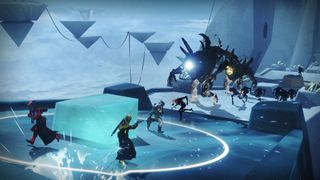
That's a lot of activities, what do I need to do to complete them? And what do I get?
Public Events - Public Events are spread across the entire system and vary from planet to planet. They often require teamwork to defend/destroy a localised objective and reward those taking part with a chest that contains random loot. For additional loot, players can fulfill secret conditions during these events to gain extra rewards.
Crucible - This is your quintessential PvP playlist. Players are put against each other as teams or solo. Modes start with your typical deathmatch set up and progress towards more control oriented variants. Every now and then there's also the opportunity to take part in a game mode called Mayhem in which supers automatically regenerate and everyone just goes wild. You receive fairly generic loot per match completion, but this can be bolstered by completing Weekly/Daily activities for Powerful Gear and Legendary Gear by leveling up through the inbuilt Crucible experience system, called Valor. There are also additional Crucible Tokens awarded for every completed match that can be traded in to Saladin for further Legendary Gear.
Iron Banner - Iron Banner is a seasonal event in which players are able to partake in PvP modes not too dissimilar from the Crucible, but this time all of your Power Levels are factored in. This means that the players' with the highest Power Level often has a slight advantage, but not so much that you don't stand a chance.
Strikes - Strikes are like mine recurring PvE missions that culminate in a boss fight. They are thick and fast and can be accessed through the directory of the Strike playlist. The difference between launching a strike from the associated planet and through the Strike playlist is that Strike playlists often have modifiers. There are also harder versions of Strikes available called Nightfalls. Nightfalls are like the hard mode versions of your standard Strikes with a scoring system that's dictated by a special card that allows you to tweak the modifiers for additional point multipliers. Each Strike has its own specific weapon that you can unlock when it's on the Nightfall rotation, but all strikes finish with one final chest that rewards glimmer, Vanguard tokens, and a piece of gear.

Gambit - Gambit is a clever fusion of PvE and PvP. Players are tasked with killing AI enemies in an arena to harvest emotes. Collecting enough emotes will spawn a boss known as a Primeval. The first to kill their Primeval wins. Simple. Well, kind of. There's a level of interference players can run during the rounds. After collecting a set amount of emotes, players can invade the opposing team's arena to kill them and either heal the Primeval or force them to lose whatever motes they are holding. So, in essence, you create a large tug of war between teams as you fend off invaders and whatever enemies inhabit your arena. Similar to the Crucible, you receive gear, some experience towards the inbuilt system called Infamy, and it feeds into your larger Weekly activity goals.
Gambit Prime - The balance, catch-up mechanics, and match length in Gambit were a bit off, so Bungie tweaked it and re-released a new, more balanced version of Gambit called Gambit Prime. Just like before, players fight against A.I. enemies and other players, but this time it's just one round. There are integrated roles associated with gear that has specific bonuses for this mode, it takes more motes to summon the Primeval, and you can only damage the Primeval is you kill certain enemies and stand in a rift that spawns after they fall. It's a more complex version of Gambit in many ways, but the overall theme is the same. Again, this feeds into Weekly Activity goals, you get a piece of gear for completion, and you earn Infamy points.
Daily Heroic Story Missions - These are the Heroic (read as hard mode) versions of missions you encountered throughout the story. As they are of a higher difficulty, you get better gear. There will be two opportunities a week to earn Legendary Gear from these missions and a further piece of Legendary Gear for completing three in total. Even when you have finished these goals, you are still rewarded with a piece of gear upon completion, but it won't increase your overall Power Level.
The Reckoning - As one of the additions in the Season of the Drifter, the Reckoning primarily focused on wave based PvE objectives. Players were tasked with completing one of three difficulties in a wave based dash to the finish environment. If you're interested in chaining together kills under pressure, this is definitely the game mode for you. As an added bonus, if you are able to offer specific motes before entering the arena, you will enter special legendary gear that has bonus perks specifically for Gambit Prime.
The Blind Well - The Blind Well is a tier-based PvE encounter in which players kill hordes of enemies from safe havens. After completing a Tier 3 event, players unlock the ability to complete a Tier 4 blind well which results in Legendary Dreaming City gear. The most interesting aspect of The Blind Well is that it doesn't obey the usual restrictions of fireteams within Destiny 2, allowing for multiple fireteams to be present in the instance.

Lost Forges - With the Black Armory came the Lost Forges, four of them to be exact. The Lost Forges are another set of PvE events where players kill enemies that drop orbs, those orbs are then dunked in a forge until the next wave. When you clear two waves, you'll fight a specific Lost Forge boss enemy and upon completion you will be rewarded with Lost Forge specific weapons. If you complete a Lost Forge with a leveled up weapon frame, you'll also earn a new weapon. On top of that, completing two weapon frames within one week will also earn you Black Armory specific armor from Ada-1 in the tower.
Vex Offensive - Check back on October 5th when the activity drops!
Raids - Raids are the most complex events in the game. They are typically the most time consuming and completion results in a chance of earning a raid specific exotic and each encounter rewards the player with raid specific gear. There are six raids in total; Leviathan, Eater of Worlds, Spire of Stars, Last Wish, Scourge of the Past, and Crown of Sorrows. Each of the raids are wildly different from the last and require six players to combine their powers to overcome the boss at the end.
Seasonal events - Seasonal events are just that. You can earn plenty of rare gear during these periods by completing specific tasks. There are events for Valentine's Day, Christmas, Halloween, and a few others. They might even be attached to already existing modes and just add unique twists, for instance the Valentine's event (Crimson Days) introduce two versus two crucible playlists for you and your betrothed.
Escalation Protocol - Escalation Protocol is another wave based PvE event. It's located on Mars and runs for seven waves, with the final of which being a massive boss fight. Similar to The Blind Well, you can get far more players in these events that your standard fireteam of three. For your efforts, you can receive specific loot based on the boss you kill, including the best shotgun in Destiny 2, and specific Escalation Protocol shaders.
The Menagerie - The most recent addition to Destiny. It allows 6 players to band together and run through a series of rotating scenarios, ensuring much needed variety. Instead of your typical three man group, you can squeeze six Guardians in to this activity. There's also an additional underlying item called the chalice that dictates your rewards. The chalice allows players to slot in runes to dictate their rewards, all of which are exclusive to the activity.
So basically, there's a lot of PvE events and just enough PvP events in there to keep players invested. Each type of activity has its own specific rewards and with every season Bungie have started to introduce pinnacle weapons that encourage players to tackle each of these modes in different ways to unlock exclusive weapons.
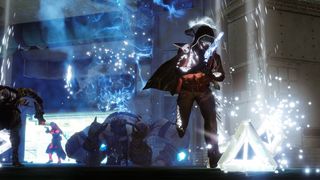
What's the difference in gear?
It isn't enough to get a piece of gear in Destiny 2, you need to find the right gear. Multiple characters can share weapons, ghosts, and sparrows, but they do not share armor. Each class also has a unique piece of armor; cloaks for Hunters, Bonds for Warlocks, and marks for Titans. Gear also has rarities. Here's a quick rundown and what they mean.
Common - White in color and nearly non-existent, these pieces of gear are very much just stepping stones on your way to much greater loot. Most, if not all of the time, they will have one singular perk and it's often very weak. You will not see any white gear after you reach the level cap, in fact I don't think you see much of it after you start to pick up Uncommon leveled gear.
Uncommon - The next step up from common is uncommon. Uncommon gear is green and possesses two perks. While they aren't nearly as bad as Common gear, they are effectively just as bad when compared to other gear. Just like common gear, by the time you reach the max level you will never see this gear type again.
Rare - Rare equipment is a soft blue and packs a soft punch. They'll be the most common drop, in spite of their name, after you hit the level cap. Their biggest drawback is that they will not reach the max Power Level, falling 20 levels short. Thankfully, they have three weapon perks to make them a bit more viable than the previous two rarities.
Legendary - Destiny 2 revolves around legendary gear and the pursuit of a perfect roll. As you acclimate to the excitement attached to the deep purple of a legendary piece of gear popping up, you'll start to scrutinize all four of the perks on the weapon. Thanks to the rather wide pool of perks and mods, you'll never be truly satisfied with your first roll and when you finally settle on your preferred build, you can then start to use Masterwork Cores to level up the weapon, boosting its reload speed, handling, or multitude of other stats to ensure it feels just right.
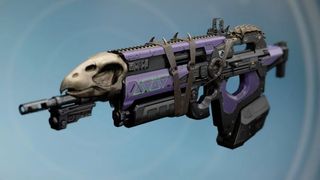
Exotic - As the rarest item classification in Destiny 2, you'll spend countless hours praying that dropped loot is the Exotic you've been hunting for. These golden yellow pieces of gear are what dictate which build you'll be playing as. With the ability to equip one exotic weapon and one exotic piece or armor, you'll need to carefully consider which pieces hold precedent over all others and what subclass they best suit.
It goes without saying, but gear is important. Whether it's finding the right legendary rocket launcher with cluster bombs to beat Riven or just looking for a good sniper rifle with snapshots sights and another elusive perk for PvP, your going to be grinding out something. Thankfully many of the pieces of gear are either quest rewards or specifically tied to certain activities.
When you add all of this together, it's easy to understand why Destiny 2 is such a huge, involved game. Nearly everything resets on a weekly basis and you can run up to three characters. You might be hard pushed to imagine playing a game for over 1,000 hours but when you start to dig deep and get the itch for rare weapons, you'll lose days at a time.
Most Popular


